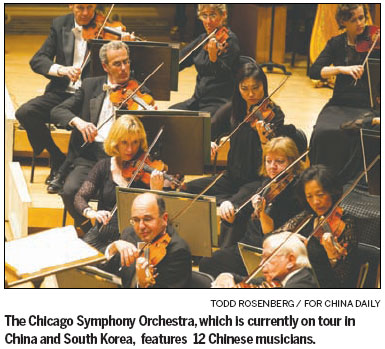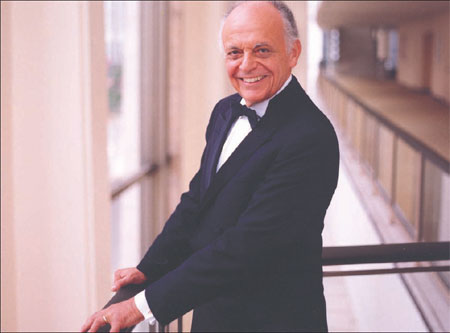Sounds of the Windy City reach China
Updated: 2013-02-01 13:24
By Kelly Chung Dawson in New York (China Daily)
|
||||||||
|
Conductor Lorin Maazel of the Munich Philharmonic is filling in for CSO maestro Riccardo Muti. Andrew Garn / for China Daily |

When the Chicago Symphony Orchestra toured China for the first time in 2009, a group of Shanghai Conservatory students was invited to sit in on a short rehearsal. What was meant to be a half-hour run-through turned into a 90-minute special performance for the young musicians, providing many with a once-in-a-lifetime chance to hear a world-famous orchestra at close quarters.
The CSO this week began its second tour of a country where audiences have shown enormous love for classical music in recent years. China is home to an estimated 30 million piano students and 10 million violin students.
Led by music director Lorin Maazel, the orchestra will perform in Taipei, Hong Kong, Shanghai, Beijing and Tianjin. The tour ends on Feb 7 with a concert in Seoul, South Korea. The orchestra will also host master classes with young Chinese musicians, and present several smaller chamber music performances for local hospitals and community organizations.
"The Chicago Symphony Orchestra is one of the world's elite ensembles, actually in a class by itself," Maazel said. "I am honored to be at its helm during the upcoming Asian tour. My goal is to allow this awesome ensemble to make its mark yet again in China, where I'm sure it will be greeted and cheered with a response commensurate with the superlative quality of the orchestra."
Previously the music director of the New York Philharmonic, Maazel serves as music director of the Munich Philharmonic, and is filling in for CSO maestro Riccardo Muti, who is undergoing hernia treatment. Since his debut concert with CSO in 1973, Maazel has maintained a close relationship with the orchestra; in 2000, CSO presented the American premiere of Maazel's own composition, Farewells, as part of his 70th birthday celebration.
The orchestra, founded in 1891, will perform two programs on the tour: Mozart's Jupiter Symphony, Brahms' Symphony No 2; and Verdi's Vespri Siciliani Overture, Beethoven's Symphony No 3 (Eroica), and Mendelssohn's Symphony No 4 (Italian).
The CSO has the most Chinese musicians of any other orchestra outside of China, orchestra president Deborah Rutter said. With 12 musicians of Chinese descent (eight of whom were born in China) in an orchestra of 109,
"We have an extraordinary number of fantastic Chinese musicians who have joined us over the last decades, and have brought incredible richness to our sound," she said. "China is an important part of our strategy, and in planning our tours we've worked hard to go back to places where we have either a new or ongoing relationship and where we feel there is an important artistic relationship to build. We are thrilled to be going back for a second tour, because as you look at the great influences on society today and into the future, China plays a very important role."
For many of the orchestra's Chinese musicians, the tour will be the first trip home in several years, said violinist and assistant concertmaster Yu Yuanqing. To be able to travel home with CSO and fellow Chinese musicians, is extremely gratifying.
"The Chinese musicians in the orchestra are very close," said CSO assistant principal viola Li-Kuo Chang, who became the first musician from the Chinese mainland to join a Western orchestra in 1988. "Everyone's busy in Chicago, but when we see each other, even two minutes of conversation in our native language goes a long way toward warming your heart."
China's rigorous classical music training system has produced a steady flow of musicians for American symphonies since the 1980s. Chang believes that the high number of Chinese musicians working in the US is evidence of an innate ability to adapt, he said. "Western music is not [Chinese musicians'] original style or musical heritage, but somehow they have a sponge-like ability to absorb quickly and learn quickly."
Rutter agreed. "You can't underestimate the contribution we enjoy from Chinese musicians in the US," she said. "In some cases, they're quite famous. In other cases, they are doing work that is not getting as much attention but are very valuable as composers and performers."
During CSO's last tour of China under conductor Bernard Haitink, the orchestra was impressed by the engagement of Chinese audiences, Rutter said. "We were thrilled by the focus and the attentiveness, and honored by the extraordinary and beautiful welcome we received. There was a sparkle and an extra charge of energy that surrounded our entire time in China; it was a very positive experience, and we're really excited to be returning."
Chang said he has seen gradual changes in the sophistication levels of Chinese audiences.
"Before the last tour I worried that Chinese listeners might use their cell phones, or talk during performances as I had seen in the past, but they were actually more quiet than our audience here in Chicago," he said with a laugh.
Chang recounted a recent trip to China with CSO maestro Muti; after one performance, a swarm of young children and high school students eagerly approached the director for autographs, leading Muti to label China "the future of classical music," Chang said.
"What impresses classical musicians the most when performing in China is the extent to which Chinese audiences have increased their interest in classical music in the last decade," Maazel said. "We now see the halls crowded with enthusiastic young people, and very often with their young children. Chinese audiences are very receptive to top-level American orchestras, and they are happy to see Americans in a cultural role outside the world of business. It is thrilling for us to see our music tradition reaching out to new audiences in the vibrant China of today. I love the CSO and I love China-what more could I ask for?"
kdawson@chinadailyusa.com

 In Photos: 7.0-magnitude quake hits Sichuan
In Photos: 7.0-magnitude quake hits Sichuan
 Li Na on Time cover, makes influential 100 list
Li Na on Time cover, makes influential 100 list
 FBI releases photos of 2 Boston bombings suspects
FBI releases photos of 2 Boston bombings suspects
 World's wackiest hairstyles
World's wackiest hairstyles
 Sandstorms strike Northwest China
Sandstorms strike Northwest China
 Never-seen photos of Madonna on display
Never-seen photos of Madonna on display
 H7N9 outbreak linked to waterfowl migration
H7N9 outbreak linked to waterfowl migration
 Dozens feared dead in Texas plant blast
Dozens feared dead in Texas plant blast
Most Viewed
Editor's Picks

|

|

|

|

|

|
Today's Top News
Live report: 7.0-magnitude quake hits Sichuan, heavy casualties feared
Boston suspect cornered on boat
Cross-talk artist helps to spread the word
'Green' awareness levels drop in Beijing
Palace Museum spruces up
First couple on Time's list of most influential
H7N9 flu transmission studied
Trading channels 'need to broaden'
US Weekly

|

|








